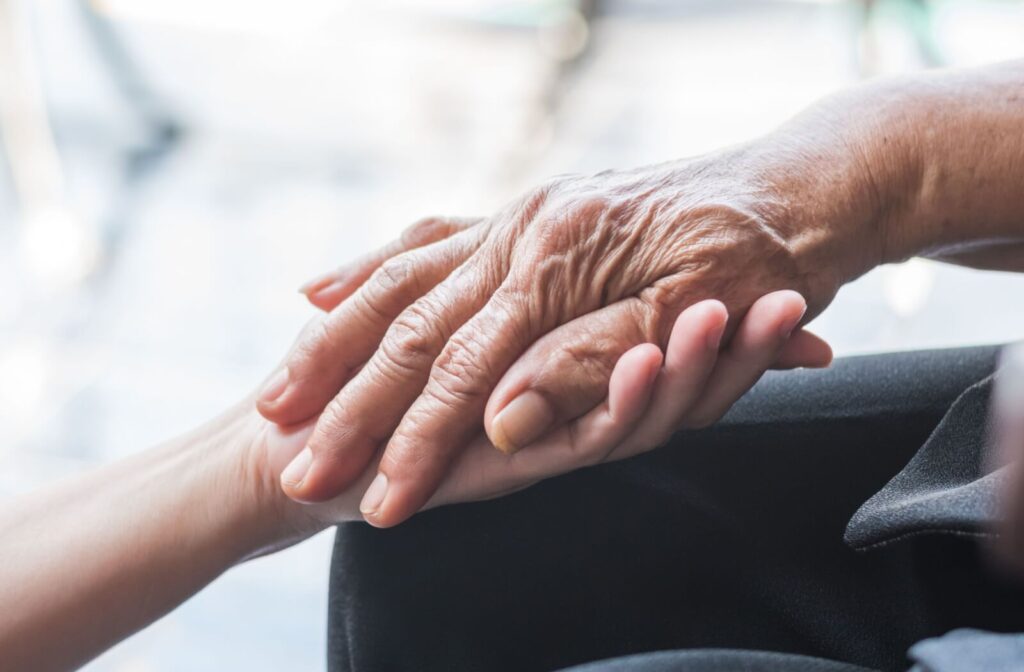Age often causes memory-related problems. Some people experience mild forgetfulness, and others may notice more severe symptoms. For older adults living with significant memory impairment or cognitive changes, personal care stands out as an incredible option that helps maintain quality of life. But how can you actually tell if someone needs personal care?
7 signs an older loved one needs personal care include:
- Increased forgetfulness
- Challenges with personal care
- Social withdrawal or isolation
- Confusion about time and place
- Concerns about safety
- Difficulties with communication
- Caregiver fatigue and stress
What Is Personal Care?
Memory care is a specialized type of long-term senior living. It’s designed to step in when everyday life becomes more of a challenge. If a loved one is living with age-related problems like physical changes, balance problems, and even some cognitive adjustments, personal care is an excellent way to help.
Personal care communities offer a range of resources, like beautiful living spaces and a team of experienced caregivers, to make everyday life easier. When a daily task becomes too much of a challenge, caregivers step in to support your loved one. This lifestyle is about addressing the unique challenges your loved one faces to help them preserve their dignity and quality of life.
How to Recognize It’s Time for Personal Care
Memory impairment is a common age-related problem. Most older adults experience a small degree of forgetfulness as they age—it’s a natural part of life. However, some patterns and behaviors indicate your loved one needs more professional support in their daily life.
1. Increased Forgetfulness
Forgetting car keys or birthdays happens to most of us. However, consistent forgetfulness that interferes with daily life is often a sign of more serious issues. Over time, minor memory loss can progress into disorientation about surroundings and sequences of events.
If your loved one begins to forget significant details, like the name of a close family member or their home address, it may be time to think about senior support options.
2. Challenges with Personal Care
Signs of disorganization in daily life can quickly worsen. Watch for signs your loved one is experiencing challenges with personal care, such as:
- Forgetting to bathe or shower regularly.
- Wearing inappropriate clothing for the weather or occasion.
- Neglecting oral hygiene or other grooming habits.
- Leaving tasks like laundry or cleaning unfinished for extended periods.
- Forgetting to take medication or attend necessary medical appointments.
They often indicate a deeper cognitive decline—especially if your loved one cannot recover from these lapses without assistance. A personal care community can offer a stable, helping hand. Around-the-clock caregivers provide assistance with bathing, dressing, meals, and medication, meaning senior care is managed safely and reliably.
3. Social Withdrawal or Isolation
Connections are vital to human well-being. However, cognitive changes and memory impairment can often mean a withdrawal from friends, hobbies, or beloved activities. You might notice your loved one avoiding events or conversations they once adored.
Senior-focused communities foster engagement with others in a supportive environment, offering group activities, sensory experiences, or casual gathering spaces. This brings a strong sense of community life every day and makes it easier than ever to stay connected.
4. Confusion About Time & Place
Older adults living with cognitive decline often experience confusion about where they are or perhaps how they got there. Forgetting whether it’s morning or evening or losing their way in familiar neighborhoods can be a hazard. In some cases, a person may begin to wander and get lost, which can quickly lead to additional dangers.
Structured routines and supervised outdoor spaces in senior living communities can help significantly here. They bring predictability and safe boundaries to your loved one’s life, which helps give your entire family peace of mind.
5. Concerns About Safety
Leaving the oven on, misplacing items regularly, or accidentally wandering away from home are significant problems. These experiences highlight the increased safety risks associated with memory impairment. Fortunately, personal care can help here with:
- 24/7 supervision by trained staff
- Secured entrances and exits to prevent wandering
- Emergency call systems in rooms and common areas
- Assistance with daily tasks like cooking and cleaning
- Medication management to avoid errors
Personal care communities can respond to emergencies quickly and appropriately. This peace of mind is invaluable, as it means your loved one always has access to professional support.

6. Difficulties with Communication
Communication struggles are a common age-related problem. This is more than just slowing down conversations or altered thought processes. Communication problems can quickly impact quality of life and lead to loneliness, isolation, and more.
Those in the later stages of cognitive changes may even have trouble understanding others or expressing their own needs. This can lead to frustration for both seniors and caregivers. Personal care teams work patiently with residents to open new methods of communication, so it’s easier than ever for your loved one to make themselves understood and find support.
7. Caregiver Fatigue & Stress
Lastly, it’s important to consider how caregiving individually impacts you. Feelings of burnout, exhaustion, or hopelessness can affect your ability to care for your loved one effectively.
By helping a loved one transition to senior care, you’re helping your entire family. You’re taking care of your own needs without compromising your loved one’s well-being. With a move to senior care, you’re giving your loved one a way to have their needs met every day—and that’s a valuable thing.
Find the Right Personal Care Community Today
The decision to move a loved one to personal care can feel overwhelming. However, these signs all indicate that your loved one needs more care than they’re currently getting. Though this is an emotional time, you’re doing an incredible thing for your loved one.
If these signs sound familiar, it’s time for a change, and our team at Merryvale Assisted Living is here to help. In our community, your loved one can thrive every day. We’re here to help, and we’re ready to welcome your loved one with open arms, so book a tour with us today.




